Estimated reading time: 11 minutes
A catastrophic event could send society as we know it back a hundred years or more. Imagine life without electricity, running water, or technology of any kind. For some, that is a terrifying thought. No cell phone. No internet. No appliances.
It’s a little embarrassing to admit it, but society as a whole is very dependent on our power grid. We’re dependent in general, which is a sad state of affairs. If you have never had to do anything manually, you’re in for a rough ride.
There are some people that won’t feel the pain like the rest of society. The Amish have stuck to the old ways. They shun modern technology. They have passed down trades for generations—trades that have gone by the wayside for most of us.
The Amish are who we should be looking to as an example for how we should prepare to survive after a major event. Living in an Amish community is a lot like living in the eighteen-hundreds. Every community has different restrictions with some dipping their toes into the Western world while others completely avoid it.
These are some of the skills the Amish have that we should all know in order to not just survive but thrive after the world has been turned upside down.
Note: Beneath each skill, we added links to articles, books, and videos where you can learn the skill yourself.
Want to save this post for later? Click Here to Pin It On Pinterest!
Animal Husbandry
Animal husbandry is a must in the Amish community. They raise their own animals for food. They know how to properly butcher the meat as well. Every portion of the animal is used to avoid waste.
- Adding Animals to the Homestead (article)
- The Backyard Homestead Guide to Raising Farm Animals (book)
Baking Without Electricity
Baking without an electric oven. Again, the bread the Amish produce is amazing. There is no reason you can’t learn how. Learn the recipes and practice making it before you actually need it. Print the recipes—you won’t have access to the internet.
- Off Grid Baking (video)
- 7 Ways to Bake Bread Without An Oven (article)
Candle Making
Candlelight is something they rely on. Making candles is a skill you will want to learn. Whether you have solar power or not, you’ll need light to see by. Batteries are not going to be a permanent solution.
- How to Make Candles at Home Safely (article)
- FULL & easy beginners guide to Candle Making (video)
- How to Make Candles: A Guide for Learning How to Make Candles for Beginners (book)
Churning Butter
Churning butter might seem really old school, but butter makes a huge difference when you are eating bland bread or plain rice. It’s a task a child could learn. Remember, they’ll be bored without their gaming systems and electronics.
- How to Make Butter (article)
- Churning in the Olden Days (video)

Cleaning with Vinegar
Vinegar for cleaning. You’re not going to find Scrubbing Bubbles or Clorox Clean-Up in an Amish home. They often make their own cleaning products. A little vinegar and baking soda are all you need. Checkout some cleaning recipes, so you are ready to make your own.
- 10 Ways to Clean With Vinegar (video)
- 23 Brilliant Uses for White Vinegar (article)
Composting
The Amish tend to avoid things like fertilizer and pesticide. Learning the art of composting is essential to keep the ground you grown in nice and fertile. Study up on natural methods to keep the bugs at bay as well.
- Composting 101: Read This Before You Start (article)
- Let It Rot!: The Gardener's Guide to Composting (book)
- How to make Compost – The Simplest Easy Method To Compost Piles! (video)
Cooking Over a Fire
Cooking over an open fire or an old Monarch woodstove is not as easy as one would think. You need to learn how to cook with cast iron and how to take care of the cast iron pots and pans. Brush up on your Dutch oven skills as well.
- 4 Types of Cooking On A Campfire (video)
- The Lost Art of Cooking Over a Fire (article)
- Easy Campfire Cooking: 200+ Family Fun Recipes (book)
Farrier Skills
Farrier skills are an essential part of keeping the horses you might need to rely on for transportation. Healthy animals are crucial to your survival.
Amish communities are famous for their barn-raising events. There is something to be learned from people who can build a barn in a day. Life after a collapse means you are on your own. You don’t get to call a contractor. It will be on you to build shelters for yourself and any animals you will be lucky to have.
- How to Become a Horse Farrier: Essential Guide (article)
- The Original Horse Bible: The Definitive Source for All Things Horse (book)
Food Preservation
Food preservation is another key skill. The Amish have mastered the craft. The methods used are not always the same as what we use in the Western world. Canning and drying without the benefit of electricity is a craft you’ll need to know.
- Food Preservation: A Year at a Glance (article)
- Stockpile Food NOW with These 10 Preservation Methods (video)
- The Complete Guide to Food Preservation: Step-by-Step Instructions (book)
Growing Food
Growing your own food is an obvious one. The Amish do it well. It is their food supply. Learn as much as you can about companion planting and crop rotation to make sure you will always have a food source. You’ll also want to learn about growing food in the dead of winter in cold boxes or in your own greenhouse.
- How To Start A Garden: 101 (article)
- The Old Farmer's Almanac Vegetable Gardener’s Handbook (book)
- Planning a Vegetable Garden for Beginners: The 5 Golden Rules (video)
Handyman Skills
Handyman skills are going to be a must. You can’t call a plumber, locksmith or contractor. You’ll need to know how to take care of the small things around the house.
- 20 Handyman Skills That Everyone Should Have (article)
- How to Become a Handyman With No Experience (video)
- The Family Handyman Build Your Skills Over 325 Pro Tips! (book)
Herbal Medicine
Herbal medicine is the only medical they use. They know all about medicinal plants and holistic remedies to cure just about any ailment. This allows them to take care of themselves and stay off the grid.
- 15 Medicinal Herbs to Grow and Their Common Uses (video)
- 10 Hardy Medicinal Herbs for Your Homestead Apothecary (article)
- Encyclopedia of Herbal Medicine: 550 Herbs and Remedies for Common Ailments (book)
Horse Riding
The horse and buggy mode of transportation has never gone out of fashion for the Amish. Are you prepared to get around when there is no more gas for the cars?
Having a buggy or carriage that you know how to maintain is going to keep you mobile. It will make your life easier if you can transport goods and your family with a horse and carriage.
- How to Ride a Horse for Beginners (article)
- Help! I Bought a New Horse: What First Time Horse Owners Need to Know (book)
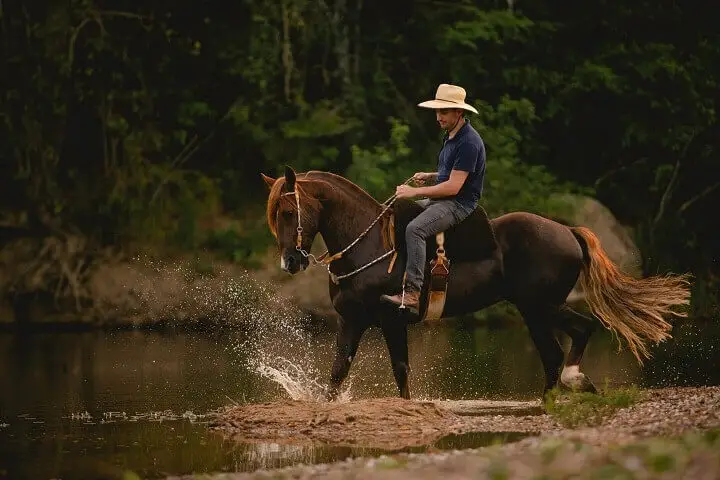
Milking Cows
Milking cows and/or goats isn’t quite as easy as it looks on TV. If you want to keep your gal from kicking and trying to run away from you, learn the art of milking now. You can’t afford your dairy animal to have sore or cracked teats from poor milking skills. You can also learn how to make sure the animal is healthy with some natural medicines and ointments.
- How to Milk a Cow by Hand (video)
- Why and How to Milk a Cow Once A Day (article)
- Keeping a Family Cow: The Complete Guide for Home-Scale, Holistic Dairy Producers (book)
Refrigeration Without Electricity
Refrigeration without electricity is a skill. The Amish have learned how to preserve their food without using electricity, this includes their milk, butter and other perishables. Research how to build one of these ice boxes to use in the future.
- How to Make A Zeer Clay Pot Refrigerator (video)
- Off-Grid Refrigerator: 12 Alternatives to Help You Survive Without Refrigeration (article)
Root Cellars
Root cellars and similar varieties are part of the food storage skills you need to learn. There are plenty of different styles you can put into your backyard now to store root crops for months without them spoiling.
- Root Cellaring: Natural Cold Storage of Fruits & Vegetables (book)
- Root Cellar Food Storage: How to Use Nature's Refrigerator (article)
- Everything You Need To Know About Root Cellaring – Preservation 101 (video)
Scheduling and Time Management
Scheduling and time management are a big deal. We’re used to the benefit of technology to help get things done faster. Without all the gadgets, you will need to get up earlier and plan your day.
Every minute of everyday counts. The Amish have time for their faith and family while still accomplishing a lot in a single day. You can as well.
- Mrs. Beeton's Book of Household Management: The 1861 Classic (book)
- Manage Your Minutes: How to Get More Done and Make More Time for Yourself (article)
Sewing
Sewing clothes will be an important skill when you can’t run down to the mall to get new stuff to replace your old clothes. If you have kids, you know how quickly they grow. You’ll need to make sure they have stuff to wear. You may also need to sew window coverings, blankets or whatever. It’s an invaluable skill.
- The Art of Sewing (video)
- Ultimate Illustrated Guide to Sewing Clothes (book)
- Homesteader’s Guide to Sewing: The Tools of the Trade (article)
Solar Power
Solar power is something that some of the Amish use. It might be a simple solar panel or a full system. It’s important you know how to fix your own system if you don’t want to live without power even when the rest of the country is.
- The Off Grid Solar Power Bible: A Step-by-Step Guide (book)
- Our Complete Solar System Cost With Battery Backup! 10kw Of Power (video)
- DIY Off-Grid Solar Power System For Homestead – Installation & Wiring Guide (article)
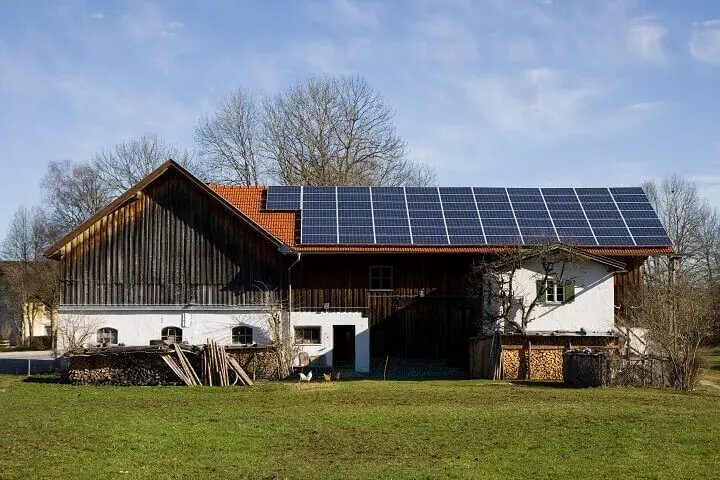
Teaching
Teaching. Yep, you read that right. You will be responsible for teaching the next generation. It’s simple enough to teach your kids life lessons, you will need to learn how to teach your children reading, math and science. Homeschooling is something you can learn easy enough.
- What Do You Need to Homeschool Your Child? (article)
- Home Learning Year by Year: How to Design a Creative and Comprehensive Homeschool Curriculum (book)
Using Tractors and Tillers
Farm equipment that doesn’t require gasoline or diesel. Tractors and tillers are not going to be an option. That means you do it the way our ancestors did, and the Amish sill do.
Plows that are pulled behind a horse are not difficult to use, but there is a learning curve. You’ll also want to store and get familiar with tilling dirt with a shovel and hoe.
- 7 Tips on How to Drive a Tractor – Beginners Guide (article)
- How To Drive A Modern Hi-Tech Farm Tractor In 2020! (video)
Water Collection
Water collection is a skill. It might sound simple enough, but it isn’t. You’ll need to understand where to position your collection containers to get the maximum amount of rainwater. If you have a well, you’ll want to have a handpump or a solar powered pump.
- The Prepper's Water Survival Guide (book)
- 10 Ways To Collect Water After SHTF (article)
- How To Build A Rainwater Collection System (video)
Woodworking
Woodworking is second nature to the Amish. They not only build their own fences and homes; they make their furniture and toys for the kids. They do all this without power tools. There is a reason Amish furniture is expensive and high-quality. It is all done by hand.
- Woodworking: The Complete Step-by-Step Manual (book)
- 7 Woodworking Tips & Tricks You Really Should Know (video)
- Woodworking 101: A Beginners Guide to Getting Started (article)
Working with a Community
Working with a community is a skill. In today’s fast-paced world, we tend to keep our heads down and mind our business. It’s the natural instinct of a prepper to keep to themselves.
In a true SHTF situation, you cannot be a lone ranger. You need your community. You need to be able to ask for help and be willing to give it.
The Amish function together. They survive together. Families grow various crops and trade with one another. They share their food and their labor. They exchange childcare. In today’s world, that doesn’t come naturally.
- Building a Homestead Community (video)
- How to Cultivate Community While Homesteading (article)
Final Thoughts
The Amish have maintained the old ways and continued to thrive. If the world were to fall apart tomorrow, the Amish would barely notice. They would just find the world to be a little quieter.
That should be every prepper’s goal. You want to wake up in the new world without fear or worry. You want to be able to get up, do what you need to do and carry on with life.
Like this post? Don't Forget to Pin It On Pinterest!
You May Also Like:



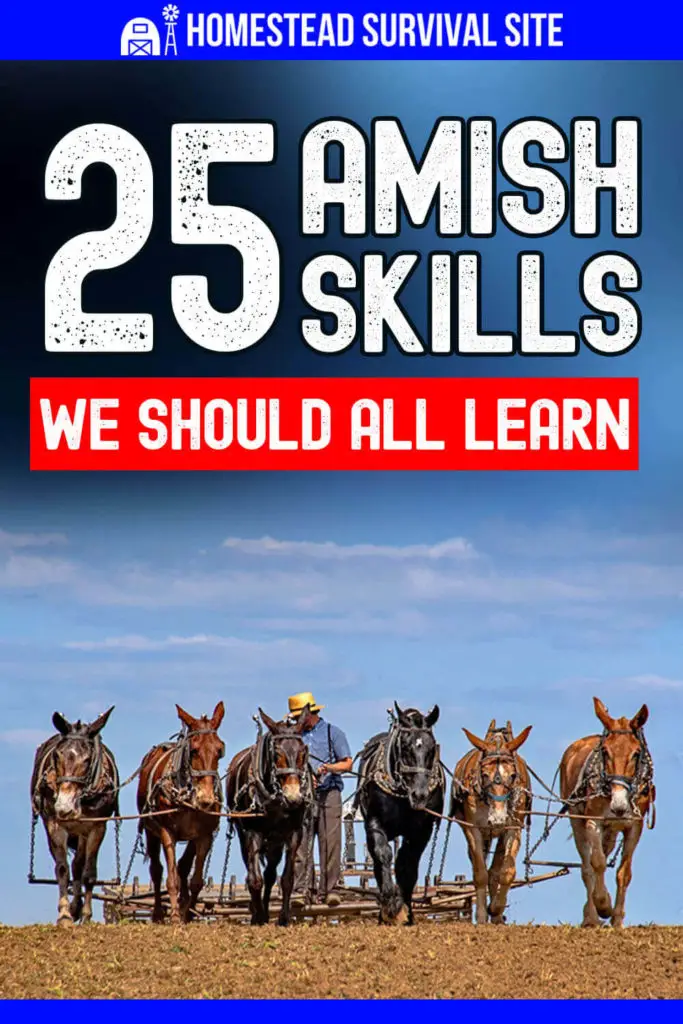




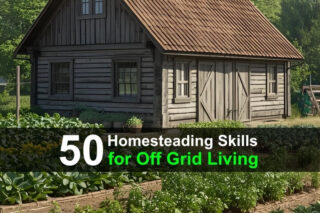
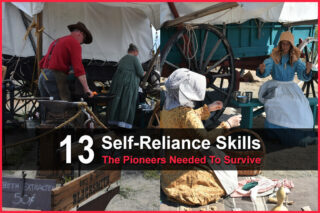


Very interesting to learn the every basic survival of humans. Thanks for the update information